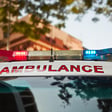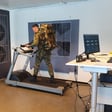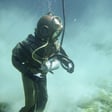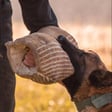Introduction to the Jobs Podcast
00:00:00
Speaker
Hey folks, you're listening to the jobs podcast. I'm your host, Tim Hendricks. As always, we get right to it. We don't want to waste your time today. We have Tara with us. Tara is, she's got a cool job.
00:00:11
Speaker
She is a flight nurse on life flight choppers. And I have been wanting to interview somebody in this line of work for quite a while. So, um, I will apologize for the listeners. We've got a toad strangler of a rainstorm right now. There's thunder and lightning and everything. So if you hear anything in the background, that's, I can't control mother nature. So that's what it is. But Tara, welcome to the show.
00:00:33
Speaker
Thank you for having me. I'm excited to be here.
Tara's Background and Inspiration
00:00:35
Speaker
Yeah. So let's go ahead and get started. Like we always do. Give us a snapshot of your origin story, so to speak, where you were born, your early upbringing, all that good stuff.
00:00:44
Speaker
Sounds good. um I was born in Monette, Missouri, so kind of around your neck of the woods. Yeah. and After i went to Monette High School, obviously, um i did a health occupations class at our career center in Monette to kind of get me ready. So basically right out of high school, I worked at Cox South um as a CNA.
00:01:02
Speaker
So I did that while going to nursing school. I graduated nursing school in 2019, and I've been a nurse ever since. um I started applying in 2021 2022.
00:01:13
Speaker
Um, and I've loved every second of So you knew, i mean, when you were rather young, you knew what you wanted to do. Me and my sister, both, my sister's also, she's a travel nurse.
00:01:24
Speaker
Um, we've known ever since we were little itty bitty, um, kind of started out when my sister, when she was three, she had a brain tumor in her cerebellum and she had a large portion of her cerebellum taken out.
00:01:35
Speaker
Um, and you know, she was always fascinated with the doctor. She was in and out constantly and, you know, I think just kind of from that, obviously I'm younger, so I didn't get to see any of that part of her life, but just knowing that she wouldn't be here today without the doctors and the nurses and the CNAs and, you know, everybody that took care of her, um, she wouldn't be here today.
00:01:54
Speaker
So I think that kind of, you know, we don't have any medical people on my direct side of the family. So, uh, it's just us two in the medical side. Um, so that's kind of why we decided to do it. And I've always known I wanted to do flight nursing.
Journey to Flight Nursing
00:02:08
Speaker
Well, I say always, like starting in high school and we really started narrowing down kind of like what I wanted to do. We had a flight nurse come talk to us in our health occupations class. And I thought it was the coolest thing. And I was like, okay, I have to do that.
00:02:22
Speaker
What was it when she was doing her presentation? Was it the was it the flight mostly or it was the... think it was just the excitement. And, you know, every day is different. You're always learning. I love that constant learning environment. Everything's always changing. And, you know, there's no two days that are the same. And I thought that would be something that's right at my alley.
00:02:44
Speaker
um You know, I don't like the monotony of doing the same thing every single day. I could never do a desk job. I've always said that. Right. Yes. Yeah. I think ever since then, they, Mercy, um I fly for Mercy Lifeline.
00:02:57
Speaker
They have a program that's called the SOAR program. So once you graduate high school, you have to be at least 18. You can ride along with them as long as you're going in a track. I think we even let like police officers ride with us too, but firefighters, EMTs, paramedics, nurses, CNAs, they let them ride with us.
00:03:13
Speaker
So I did that right out of high school, like right when I turned 18. So I flew with Lifeline 1, which is in Branson. Um, and I've ever said, cause was like, you know what? I say, I want to do this, but maybe I should get in a helicopter and make sure like yeah I can do this.
00:03:27
Speaker
I will preface this. Had you ever flown? and Well, I fly it. I've flown in you know, fixed wings, but I've never, i had never flown in a helicopter before. So it's very, very, very different. Okay. Um, I will say it's very different feeling.
First Flight Experience
00:03:39
Speaker
Um, you feel the bumps a lot more in a helicopter. I feel like when you do in a fixed wing for sure. there's a lot more of them too, cause we fly a lot lower, but. Yeah, it was just as soon as I got in there and started flying, I was like, I have to do this. so What was that first flight?
00:03:59
Speaker
ah I mean, how long were you in the air? How how was it? Were you... Did you, I guess, lean into it and think this this is exactly what I was expecting it to be? or were you surprised when you got up in the air in a helicopter for the first time?
00:04:13
Speaker
I think I was a little bit surprised. um I thought it would be a little bit more scary, I think, um just because if it's so open. You can see everything when you're in the front. Right. ah So I thought it'd be a little bit more scary, but it's really not.
00:04:27
Speaker
Um, I thought I'd get more nauseous. I'm, I have a very nauseous stomach. So don't let that, if you're out there and you're like, Oh, I can never, I get super carsick. So do I, I just take Zofran right before I go, if it's going to be a bumpy day, but it works out. And you know, there are days that we throw up and it's not a big deal. It happens. Um, a lot of my partners do it as well.
00:04:45
Speaker
So don't let that deter you. But, um, you know, I thought I'd get really nauseous and it really wasn't that bad. We went on a scene call, picked up somebody from the ambulance that was already intubated. And, um, I'd kind of gotten to know the crew a little bit cause I had done some short flights with them in the area before we took my first patient, my first two days that I flew with them, I didn't get anything.
00:05:02
Speaker
Um, and that's just kind of, they called me the the white cloud. They loved having me because they didn't do anything all day when I came, but We finally got the first patient. They were like, oh, you can you can bag them on the way into the aircraft if you want. I was like, ah yeah.
00:05:17
Speaker
So they were the crews were just, I think they made the experience even better. um They involved They wanted to know who you were. you know It's kind of like a mini job interview prior to you know actually having your real job interview, kind of like test the waters. And we've contemplated doing something like that where we have a program where people can fly with us ah
Certification and Experience Requirements
00:05:37
Speaker
regularly if they're thinking about taking this path. And I think that would be really cool for people to see what it's like and for us to get to know you too to make sure it's a good fit.
00:05:45
Speaker
You probably need to find people like you are. I can tell already you're a go-getter. You wanted to, if they gave you the opportunity to do something, you are going to jump in there and do it. And you can't, you can't be a wallflower in that line of work. you can't. You definitely can't. It is a detriment to it. You know, you can't be scared to do things. And I will say being a nurse, as opposed to being the medic, I am a lot more cautious in that aspect of like, do I toot this patient or do I wait it out? Cause you know in the hospital, it's more of like, we're going to let this ride as long as possible, you know, least invasive methods first. And Sure.
00:06:15
Speaker
I feel like, you know, medics, they take it from the standpoint of like, well, if they need it, they need it. um Why would we wait? So it kind it took a little bit to get used to that. But I'm still am a lot more cautious than a lot of the medics and even some my nurse friends too. So I am a go getter, but I also like try to take back a little bit and sure it makes a good mix, but.
00:06:34
Speaker
more methodical maybe? Yes. Yeah. I think about things very, very thoroughly in my head first. Maybe it's ADHD, but... I have one question about you know getting, I guess, carsick or airsick.
00:06:47
Speaker
That is something I hadn't even... that wasn't even on my radar, but I can see that it's not as smooth of a ride as a plane. It's going to be a little more bumpy and all over the place. Now, do you just have like a bag? Really?
00:06:59
Speaker
Yeah. So it kind it kind of depends on the day. We look at the winds and stuff. Like if it's super windy on the ground, it's going to be really windy up in the air. But, you know, even then, sometimes the pilots, they're amazingly smart. They can find what altitude to fly where there's not a crosswind. Usually when you get those crosswinds is when it gets really bumpy and it hits you and you're going up and down and back and forth and... and Um, just the different changes in pressure too, we'll make you drop lower and then come back up.
00:07:28
Speaker
Um, so I kind of lean on them too. Like if they tell me, yeah, it's going to be rough out there. You can usually tell just by walking outside, like, yeah, it's going to be a rough day. Um, I'll usually just take my medication beforehand.
00:07:40
Speaker
Um, usually once you get an aircraft, if Zofran's all you got, is probably not going to work. You're just going to throw up and it'll be fine, but. ah we've I've had calls where me and my partner both have gotten sick. It's usually worse when it's hot. You get in the slightest bit warm in the in the back of that aircraft and you're done on a bumpy day.
00:07:59
Speaker
There's no saving it. But we have just the same as we would give a patient or if we take a parent rider with us up front. We have little bath bags, basically, like what you wouldd have in the ER that we use.
00:08:11
Speaker
You're not hanging your head out that little window.
00:08:16
Speaker
So let's jump into, I want to talk more about what your day-to-day is like and and what it's like when you you know actually go on a call and when you land in remote places and stuff like that. But let's talk about your education. Now, you had mentioned that you were pretty set early on yeah with that initial exposure from ah professional that came and visited your school, which side note, anybody listening, you have a lot of people that go to schools with different careers and This is, you're a perfect example, Tara, of that seed was planted and that's how you recruit.
00:08:49
Speaker
So. yeah Exactly. It really is. And if there's anybody out there that's like, man, it'd be really cool if you'd come talk to my class, feel free to reach out to Mercy Lifeline. We'd love to come out there and talk to you guys and tell you about our job.
00:09:01
Speaker
So your education, you, you graduated from high school. You knew what you wanted to do. You did some ride alongs. Now what? Yeah. So knowing what I wanted to do really helped because I had to focus in on what kind of certifications I would need and also doing the SOAR program and talking to and nurses and the medics and knowing what I needed and what would be helpful and what wasn't helpful was super nice.
00:09:26
Speaker
Um, At Mercy, you have to have a minimum three years of nurse experience, and it has to be in an ER or an ICU. and We're kind of leaning more towards ICU as opposed to yeah ER, but we'll still take ER nurses. They are still incredibly smart, um and it's still they're still a valuable person.
00:09:42
Speaker
tool to have, they just don't take care of some of the, you know, i'll you know, somebody on five pressers and somebody that's on a balloon pump or an impella and things like that. Um, ICP monitors, they don't get those things. So I think in some ways we're leaning more towards ICU, but we'll still take VR as well.
00:09:58
Speaker
Um, so you have to have three years there. i believe that air care it's four now. It used to be five years, but they dropped it back to four. So anywhere from three to five, but three is the absolute minimum. And i will say,
00:10:09
Speaker
even at three years experience as a nurse, you're you're kind of getting comfortable where you're at. It's, it's still very new to go into flight.
Flight Nursing Operations
00:10:17
Speaker
So I would err on the side of like, maybe start around four years, even five, um, just to make sure you're comfortable and you're competent.
00:10:25
Speaker
Um, cause you don't have the backup like you do in the, you know, hospital when you but just put the code button on and you've got 10 people that immediately run into your room. It's not like that in flight. It's just you and your partner.
00:10:37
Speaker
But right. So you have to have those years of experience. You have to have a critical care certification and that can be your CEN, your certified emergency nurse, and your certified critical care nurse.
00:10:48
Speaker
But CAMES has actually come out to say, which is our accrediting body, that you have to have your certified flight registered nurse. So um I got my CFR in last year. i believe Mercy is doing within six months of hire now um because it is a requirement of CAMES.
00:11:03
Speaker
So and I still highly recommend getting your CCR in first to make sure that you have a good base knowledge um because the CFR is not for the faint of heart. It was very difficult. and But that is a requirement within the first six months to a year of hire is getting your CFR in.
00:11:21
Speaker
There's multiple, multiple, um, different certifications. Like you have to have ACLS, um, which is your cardiac but adult cardiac life support. You have to have your basic life support.
00:11:33
Speaker
You have to have your PALS, which is your pediatrics. You have to have, um, neonatal resuscitation. You have to have some sort of trauma course, be that like the TNCC,
00:11:44
Speaker
um For Lifeline, when we do our trauma day, we do a trauma course then as well. um It could be you could sit in on ATLS, which is generally just for advanced providers. So like nurse practitioners and doctors, but you can take it as an auditor and still kind of get credit for it. You just don't get the actual cert for it, but that counts for Mercy Lifeline.
00:12:06
Speaker
Um, you have to take basic hazmat. Um, they would like us to take, and I took the vehicle rescue technician course and I highly recommend taking that as well. Um, I think it just gives you a better, especially from a nurse standpoint, when we don't do scene calls, it gives you a much better idea of scene safety when it comes to car accidents and yeah also being able to take a step back and be like, Ooh, I don't know if that crib's going hold. Like having a better understanding is never a bad thing.
00:12:33
Speaker
Um, and there's just, there's so much as a nurse, you're not required to have your medic. Um, and we are a little bit different at Mercy because we also service Arkansas because we have, so we have four bases. We have, um, a base in Rogers and then we have a base in, um, Fort Smith.
00:12:51
Speaker
So those bases, if you are, a nurse, you have to have your EMT as well in Arkansas. So the caveat with our Missouri base up at St. Robert, where I work, we don't need it because we don't service Arkansas necessarily.
00:13:04
Speaker
But if you work at Lifeline One in Branson, you service Arkansas. So you also have to have your EMT. So I think they kind of just prefer that everyone have their EMT if possible.
00:13:15
Speaker
um i don't know necessarily how air care does it because I'm sure being in Springfield, they serve as a Northwest Arkansas quite a bit, but yeah um kind of would be something that I would talk to them about if it's something you need to get. But I highly recommend if you're a nurse getting your paramedic.
00:13:31
Speaker
They have the RN to MedicBridge programs out there. um It's definitely not the same as going through a paramedic course. You definitely don't learn everything like they do. um But I think it's good to get your hands on intubations and different skills that you wouldn't do, like crates and stuff like that, that you wouldn't do as a nurse.
00:13:50
Speaker
And just, again, having that that knowledge and having the ride-along time on the ground for the scene safety and knowing what it's like just having two people. So I highly recommend getting that as well if you're a nurse. One question and the, the pathway from the beginning to where you're at, do you find a lot of people go straight to nurse and then flight nurse, or do you have folks that they start as a paramedic? Maybe they run on an ambulance.
00:14:16
Speaker
They do that for a while and then they transition into going after your line of work. Is there a, is there one particular pathway or those the two that you see? I've seen both of those done. We actually have a couple at Lifeline One and that they were medics.
00:14:32
Speaker
They were ground medics for a couple of years. They decided to fly. They've done flying for a while. And now they're like, okay, now I want to make more money. Let's go back and get my RN license. So they'll both ask if they're RN license, but you have to complete a thousand hours on ICU. think at the minimum a thousand, I could be wrong on that. So don't quote me on that But you have to complete a certain amount of time as an ICU or ER nurse before they can consider you ready for flight.
00:14:57
Speaker
so So even though you've been flying as a medic and we do the same job, it is whether you're the medic or the nurse at Lifeline, at least I can't speak for other programs like AreaVac, but at Lifeline, we swap who's lead provider each way. And one person's tasking while the other person's leading the call. And then we switch the next call. So you are doing the same job, whether you are the nurse or the medic. It's just unfortunately the nurses get paid.
00:15:18
Speaker
a pretty decent i amount more than the medics do. So that's why it entices a lot of them to go back to the get their RN. um But you do have to complete your time in an yeah ER or ICU setting before you can be paid as a nurse.
00:15:31
Speaker
Now, one thing you just mentioned there, and let's jump into your crew makeup. You obviously have a pilot, a single
Mentorship and Teamwork Dynamics
00:15:40
Speaker
pilot, I would assume. And then you have a nurse and then a medic. So you'll have three on board, which leaves room for how many patients can you typically take? Just one? So we take one.
00:15:51
Speaker
No, we do have the capability of taking two. We do have a second stretcher that we leave at the base. So if it was a mass casualty mass casualty incident, we could take two patients and each of us would take care of one.
00:16:03
Speaker
I have not seen that done. And I don't know if anyone that i work that I work with currently that has ever done that other than maybe one of the medics that used to work in Antonio in Colorado. So it's not been done at our base since I've been there, but it is possible to take two patients.
00:16:17
Speaker
It seems like stuff would have to hit the fan for you to have a second. Yeah, I think it'd be one of those things of light. And we would also have to get approval from our director. Like, hey, we're going to this mass casualty. We're going to put the second stretcher in. But it is ah it's a big ordeal because we have a lot of equipment that we have to take out.
00:16:32
Speaker
We have to take the other seat out and put it up. So it it's a lot of movement for that to happen. are you Obviously, there's a weight limit. But what what kind of leeway do you have as far as I mean, do you typically hire folks that are petite?
00:16:49
Speaker
So but we recently started reinforcing this. We have a 250 pound weight limit for crew. So in all your gear, you have to weigh less than 250.
00:17:01
Speaker
And we brought back our fitness test as well. We just completed that about a month and a half ago, I think. um At this point, it was like end of February. So we have a fitness test that we have to pass as well.
00:17:11
Speaker
And it's it's not punitive, so it's not like you just have to be passing with a certain percentage or show improvement from your last. They're not going to fire you if you don't pass it. But it does give them at least a baseline of where you're at and making sure that you can at least perform most duties of the job. Obviously, someone like me that's and 125 pounds, I'm not going to able that.
00:17:31
Speaker
i'm not going to be able to lift that structure into the, because are we have our own structure um that loads into the back of the aircraft. um I'm not going to be able to do that by myself if the patient weighs 400 pounds.
00:17:42
Speaker
That's just not physically possible. But that's why there's two of us. So i think it just gives them a benchmark of like, could they perform most of the duties? Yes. And also if you get hurt at work, you have to return to that baseline too.
00:17:56
Speaker
What would your fitness test, can you give me a quick little snapshot of what that looks like? Yeah. so we did a couple, there's um a bunch of mobility stuff too, especially with your neck and your hips.
00:18:07
Speaker
So there's a big mobility portion, which thankfully do yoga. So I'm pretty good on that. So I got pretty good scores there, but you have to do, we took the deadlifts out because everyone was passing the deadlifts pretty good previous year, but and we do a farmer's walk. We do a little ruck with a weight sack on.
00:18:24
Speaker
Um, we do sled push pulls and then they have this new little bar that you like pull up on kind of like you would, you're in a deadlift position, but it just measures your pulling force essentially.
00:18:35
Speaker
Um, so just kind of those basic things. Um, there is a lot of cardio with that. Like it doesn't sound like it saying it out loud, but you're doing all of those things back to back to back with like a minute break in between. So towards the end of it, when you're getting to that rep where you have to lift that back on the back of your back and run with it, it gets pretty tough.
00:18:54
Speaker
Is it for time or is it just a completion? It's just a completion. Okay. You have to do it for, it's a completion per like their timeframe. Some of them are timed and some of them are um based off rep.
00:19:07
Speaker
Oh, I see. Okay. So your education, you have gotten all of the education that you got, um all of the different training. and I'm not even going to try and remember all those acronyms because I won't remember it at all.
00:19:22
Speaker
So you finished it. how How does it work as far as do you have to complete all of that before you can actually start working on Or are there, I know there were some hours you had to get in the ICU and then you can get like a job.
00:19:36
Speaker
I'm working and earning my education at the same time. So that's only for the medics. The medics theniveics can keep their medic spot while they're going to nursing school or while they're finishing up their hours. They can stay a medic, but they don't get paid as a nurse or take one of the nurse positions until they've met their hourly requirement.
00:19:53
Speaker
Um, for, you don't, for nurses, um, you don't have to have, like I said, you don't have to have the CFRN, um, and And I think they give you six months to a year. i think it's somewhere around there.
00:20:04
Speaker
um Now, they did change it because KAMES made it a requirement. So it might they might have dropped it from a year to six months. i already had mine, so I didn't worry about it. But you have to have that within six months of hire. And then the neonatal resuscitation you have to have within six months of hire. They don't make you have that prior to.
Emotional and Financial Aspects of Flight Nursing
00:20:20
Speaker
um And then hazmat, you don't have to have. the incident command stuff, like the ICS 100 and 200, you don't have to have until six months. And a lot of that stuff, they kind of build into our orientation.
00:20:32
Speaker
ah So they let you know like, hey, just go complete this online FEMA class. um So it's not hard. It's just work that has to be done. But some of that stuff is like, you have to have it within six months of hire.
00:20:44
Speaker
But like your ACLS and your BLS and your PALS, those are you have to have prior to. But working in an ICU or ER, you should already have those things. I'm sure that there's a ah variance depending on the individual that's um trying to achieve the goal of doing what you do.
00:21:02
Speaker
But is there a general timeframe as far as like nursing school is this long and then this kind of stuff takes, I mean, do most folks take three, four, five years to get from yeah point A? Okay. All right. Yeah. it I would say minimum. Yeah.
00:21:15
Speaker
I would, I mean, man, nursing school between ah graduating in 2019. So, I mean, five, six years, probably, I'd say is about average from graduating high school.
00:21:28
Speaker
Okay. So it's not a, it's not just, I'm going to go do this. You really got to be determined. because Yeah. You have to keep at it. And I, I mean, i applied right when I was like maybe a couple months shy the three years, just to kind of feel the waters and like see what they were expecting and, you know, see what I could.
00:21:47
Speaker
what I could do to improve before it's time for me to get hired. And, you know, obviously I got turned down because I didn't have the yearly requirement, but it was super helpful to be like, oh, you should make sure you go have your NRP. That way you don't have to worry about that. And like go do your hazmat. So some of that stuff I did prior to, but because I applied a little bit early, just because I wanted to see of where I was at.
00:22:07
Speaker
Is there a minimum age that you have to be in order to be a nurse as far as, I mean, most folks probably aren't going to complete the training before the age of 21. No, I mean, I wouldn't think before.
00:22:19
Speaker
I think we might have some there at 20, maybe. um Because, you know, you can graduate high school, basically almost an associate's degree now. So it's kind of wild the things that you can do in high school. But I don't honestly know. if I would say 18 is the minimum, the absolute minimum, because that's what it is to work in the hospital. So okay I highly doubt that they would hire anybody that young. That's very, yeah might need a little few more years to mature from that. but Get some experience.
00:22:47
Speaker
Right. What is the shift that you work? Are you ah on like a 24 or 12 or 10 or ah you're on 24s? Yeah, we do two 24s a week.
00:22:58
Speaker
And we kind of have a rotating schedule. I know a lot of programs out there do like you do this many days on, you have this many days off. Um, but ours is just a rotating schedule. Um, it repeats at mine repeats every five weeks.
00:23:10
Speaker
So, um, just two days a week, you can work up to 36 hours in a row. Um, but you have to have eight hours off in between, ah one shift to the next. So you can work 36 and then have eight hours and then come back So, you know, in the fire service that I've made a career in, we work a 24 hour shift typically, and we come in in the morning, everybody gets their coffee, and then we start checking off all the equipment and talking about what the day and walk us through what an average shift would be ah in your line work.
00:23:40
Speaker
Yeah, absolutely. So we get in our shift starts at eight. So we usually arrive about 10 minutes early, somewhere five to 10 minutes early. um Kind of talk with the crew about the happenings from the previous shift.
00:23:51
Speaker
ah We always ask them how many calls they received and how many were completed. Because, you know, we turned things down for different reasons, or maybe they had when they were on standby for and got canceled, things like that.
00:24:02
Speaker
So we get that information from them. We ask them if there were any issues with Anything, comms, equipment, anything like that, any aircraft issues, um if they're doing any pilot training that day, if they're going to be any scheduled, and like downtime for ah scheduled maintenance, things like that on the aircraft.
00:24:22
Speaker
And then once they leave, we clock in and we do our we have an ops brief. um So we put in who's on duty for the day, their phone numbers to be contacted but if our MercyCom has issues or it needs to call us for any reason.
00:24:37
Speaker
We put who the pilot on duty is, who the mechanic on duty is, um and then the same kind of information information. You know, if there's any mid-shift crew changes, because sometimes we'll have people come in at 12 hours.
00:24:49
Speaker
i mean They have other things that need to do. So we'll talk about that. And then we'll put our weather code. So red for weather means we're not going anywhere like today. There's, you know, thunderstorms, convective thunderstorms out there. So we're not going anywhere.
00:25:03
Speaker
um We're red for weather or we're yellow. Yeah, we could probably go somewhere. it Kind of depends where. So you have to check with the pilot. And then green means we're pretty much good to go anywhere. Um, and then, those are our weather codes. And then you just put, if there's any any scheduled maintenance or pilot training, so that, and this is sent to MercyCom and our leaders so that everyone knows what's going on at our crew for the day, since we have four bases.
00:25:25
Speaker
Um, And then we do, we start out with a fatigue score. So this is what kind of helps us throughout the day kind of gauge how tired we are. It's a very good safety measure for us.
00:25:37
Speaker
It starts with how much sleep you got the previous night, um how many years you've been doing it. Um, and then you do the temperature outside. If it's super hot or super cold, that affects that, um, turbulence, which you wouldn't necessarily know unless you've already flown. So that's usually blank until we go somewhere.
00:25:58
Speaker
Um, hours on duty, you have the amount of sleep you've had during the shift. So say we take a nap every two hours, it's minus one point. Um, so those are kind of things that go into the fatigue.
00:26:09
Speaker
Um, and then there's also a little section on there that's just for illness, stress or other. So say you kind of have a head cold, you can put a one on that just to give, you know, a little bit of ah or say you haven't eaten all shift, you know, you could put two there like, Hey, I need a little bit of time to eat something.
00:26:25
Speaker
Um, Things like that. And then transport time. That's the other big one. So, if you know, you did a six hour transport. That's going to bump up your time quite a bit. Once we hit a score of 20, we have to go down for four hours. And MercyCom is not allowed to call us for four hours. So we're completely out of service for four hours. And then we go back up when that four hours is up.
00:26:45
Speaker
So we fill out all that. um Once we do that, we go back and we check the fridge temps. So we have a medication refrigerator that has some medications in it. We just make sure it's within range.
00:26:56
Speaker
We check our freezer that has our cooler packs in it for our blood because we carry blood on our aircraft. And then we check the blood fridge. So we look at all of the blood products, make sure the temperature indicators are okay, check the temperature indicators.
00:27:08
Speaker
and that refrigerator. Um, on Mondays we changed the discs too. So we can send them to the blood bank to show that, you know, it was within range. And then we go out and we check the aircraft.
00:27:20
Speaker
So, um, We check all of our equipment, make sure that everything was restocked appropriately, make sure we had everything we need. We check our O2 on board, make sure we've got enough of that. We do just a quick rundown of the aircraft, make sure nothing looks out of place to us.
00:27:34
Speaker
And then we go back inside. and There's a tone test at 845. and So that's just MercyCom paging both of us out to make sure all of our radios are working. We each respond individually with our numbers um just so that they know everyone's accounted for and their radios are working.
00:27:50
Speaker
And then we had our huddle at 9 At 9 a.m. we talked about each of of the four bases. We also have a kids team as well. So the kids team comes on. They say they've had any transport in the last 24 to 48.
00:28:01
Speaker
Any issues on their side. and Then we, comms comes on and they'll tell us if there's any diversions in the area. um like PICU divert, NICU divert, no IR at this place. So we kind of know the happenings of the hospitals.
00:28:15
Speaker
um Generally speaking, ah I mean, it matters to us, but it doesn't really matter because if it's a TCD, we're going to bring it wherever it's closest anyways. um But we do try to keep in mind, like if somebody is on ICU divert, we're going to try really hard to not take a scene call, like, cause we have Cox and Mercy at Springfield. So maybe if Mercy's on ICU divert, we would bring it to Cox.
00:28:35
Speaker
which they would tell us in the air as well, but it's just something good to know in the mornings. um And if like, there's no coverage in a certain area, like, oh, there's no neurosurgery coverage here, and then we're not going to take a head injury there.
00:28:48
Speaker
i What's your coverage like as far as you had mentioned that there's different locations where you have, I'm assuming they overlap a little bit, but yeah how how far out can you travel? Are you going like, we don't go more than two and a half or three hours in each direction, or I'm just making up numbers, but.
00:29:04
Speaker
No, you're totally fine. So in the St. Robert area, we typically fly our scene calls either to Mercy sp Springfield or Cox South. Generally, Mercy is Springfield, just because we are Mercy and a lot of the people in the area go to Mercy Lebanon. So they have Mercy providers. you um But we will go to Cox as well. It's not to say that we won't. And I have taken scene calls there. um Inner facilities are a bit of a different story because we will go wherever the accepting position is.
00:29:30
Speaker
So we will go to St. Louis. And also if it's a scene call, that's a pediatric patient up where we are. It's not, uncommon i've gone a couple times to like mercy children's or you know somewhere that has um or like um creev core has children's capability um that's just a little bit better than springfield or there's cardinal glennon in st louis so there's different areas that we can go that if it was a pediatric we might go up north even though it's a little bit further if not technically the closest it's the most appropriate location for them to go
00:30:02
Speaker
um But yeah, most of the time we're going to bring them back to Springfield. But we will go to Barnes. We'll go to Kansas City. We've taken people to Memphis before. I have not personally done that, but I know that crews have. If you're over further east, like Shannon County or Cape Girardeau, that's actually not that far to go to Memphis.
00:30:18
Speaker
But so yeah, we'll pretty much go wherever they tell us to.
Job Satisfaction and Career Encouragement
00:30:21
Speaker
We may have to stop a couple of times to refuel, but... I'm trying to remember. Does Springfield, both Cox and Mercy, are level one trauma? Is that correct? Yeah.
00:30:29
Speaker
They are both level one trauma, stroke, and STEMI currently. um i've For a while, Mercy was a level two stroke, but yeah they have just recently reinstated the level one. So they are both level one everything. So we can take them to either place. It's patient preference at that point.
00:30:47
Speaker
Are you taking, um i don't, you've mentioned Fort Smith and down in Arkansas. ah Do they have level one down there or are you going to go to Springfield or up to like Kansas City or St. Louis if you needed ah For scene calls, they take most of theirs to Mercy Springfield. I do. Okay.
00:31:03
Speaker
There's not a ton of trauma centers there. I think um they have a pretty decent children's capability in Arkansas. And I don't flat haven't flown down there yet, so I'm not a huge expert on their area. But I do feel like I see them most of the time coming back to Springfield with their stuff.
00:31:17
Speaker
ah Sometimes I'll take them to Mercy Fort Smith, but I feel like a lot of times they do end up just flying them to Springfield. Do you have have the same crew most of your shifts or are you constantly working with different people?
00:31:31
Speaker
So it depend depends on who who you are. So me personally, I work with pretty much every medic that we have, um just the way my rotation works. But I do have two partners that are my main partners, um Luke and ah Gary.
00:31:46
Speaker
So they are, it's kind of nice because you get to know everybody a little bit and I get to see how everyone does things. But sometimes it's like, oh yeah, they like to do things this way. So it can be a little confusing. It is nice when you have like one main partner, um but I do kind of like flying with them.
00:32:02
Speaker
I can see the benefit, though, of having the same one or two people because you know their mannerisms, what they're going to reach for, and the continuity is really nice. Yes. You don't even have to speak and they already know what you want.
00:32:13
Speaker
Yep. But I feel like we've been working um together long enough, all of my partners, that I still kind of, we already know that we've gotten used to each other, so it's not as big of a deal. What areas, if any of specialization do you have when you reach the flight nurse level?
00:32:32
Speaker
Is there anywhere else to go? I mean, I guess you'd go be a pilot or something, but what you're at the pinnacle, aren't you? Yeah. i I really feel like you are. Um, I've seen a lot of people go back to nurse practitioner school, um, cause you just, you make a little more money, but you really don't do anything more than what we do.
00:32:50
Speaker
um I've seen people go to CRNA school, but again, and you don't really do anything differently other than placing art lines and epidurals that you would you know wouldn't do as a flight nurse. I think for some people, if you're looking for increased pay, your options are nurse practitioner route or the CRNA route.
00:33:10
Speaker
I have spent a fair amount of time in the back of an ambulance, especially when you're a rookie in the fire service. You usually, if the if the box needs a rider, then you know on a call, they'll send the rookie. And so I've spent a fair amount of time in the back of those things going down the highway. They're bouncing all over the place, and it's impossible to do anything, especially start a line or whatever.
00:33:32
Speaker
How is it, or do you do most of your work like that on the ground before you lift off? Or is it just, you're doing a lot of that stuff. We need to get going. And so everything is in route.
00:33:43
Speaker
Yeah. So at Mercy, at least, I know there are some that will do a lot of their stuff on the ground. Our goal is to be in and out as quick as we can. Now, that's not to say that we won't sit down and take our time on things that need it.
00:33:54
Speaker
There are things that can't be left unattended. um Your life-saving ABCs, you know, I'm not going to leave an airway unattended if they're not able to maintain their own airway. Now, if it's something where it's a COPD they're going to wear out eventually, i may wait till we get to the aircraft.
00:34:08
Speaker
and I'm more comfortable with my equipment. I have all of my stuff. um We... typically don't bring a ton of stuff out of the aircraft because it's quicker in and out. If you don't bring a ton of stuff, and we'll bring the monitor. If it's appropriate, we'll bring the vent if they need it.
00:34:22
Speaker
um But other than that, we bring the minimum amount necessary because we don't want to be bogged down by trying to grab or leave equipment on scene. Our goal is to be on scene less than 10 minutes um for just regular scene calls and less than 20 minutes for inter-facility transfers.
00:34:38
Speaker
And I feel like most of the time we meet that requirement. With some of the traumas, it can be kind of hard you know Say you get on scene and they're hypotensive and tachycardic and you need to intubate, but can't because their pressure is not good enough.
00:34:50
Speaker
You have to, you know, pre resuscitate them first. So that's going to take a little bit of time. But, you know, whether that's just some fluids or if you have to get blood, pressers. So there are some things that weren't you being on scene for a little bit longer. But especially with those traumas, that golden hour, or us being on scene or even in the air, we're not fixing them.
00:35:08
Speaker
We are a band-aid and getting them to the place that can fix them. We are not an OR. We can't fix their problems. So our goal is to get in and out as quick as and safely as possible for the patient. What is your, or do you have a benchmark when let's say you're at the hospital and then ah ah I don't know if you get tones or a call comes in.
00:35:28
Speaker
Do you have a certain number of minutes where it's like, okay, time to get to work. We have five minutes, six minutes. i I don't even know how long it takes to fire up the helicopter. So ours actually fires up pretty quick. Some of them are a little bit slower. and We at our base have a hangar. So On average, if it's in the hangar, like on day like today, we'd keep it in there. If it's super hot or super cold, we'll keep it in the hangar.
00:35:49
Speaker
It takes us six minutes to open up the hangar doors, pull it out and get lifted. Good grief. Yeah, it's pretty quick. So we like to be 10 minutes or less. That's ah again, our, our lift times are 10 minutes or less. That's our goal.
00:36:00
Speaker
It's something we track after every call that we do, we put in how long it took us to do all these things. Um, so it takes us like on average, six, seven minutes to get it out of the hangar and lift. Now, if it's already out, we can be in the air in less than five minutes.
00:36:15
Speaker
It kind of depends on who the pilot is. Um, And, so you know, some of our pilots are really quick and they're out there before I even have my, you know, my helmet and stuff in any of my gear. But we sit in our flight suits most of the day and our boots on and we're ready to go.
00:36:31
Speaker
What is the typical call? I mean, are you landing a lot of times on like Highway 44 or are you doing... We prefer to land at our, we have designated LZs and they, the crews in the area are really good about finding those LZs.
00:36:47
Speaker
It's just safer during the day. It's not that big of a deal. Um, but you know, they have to shut down the road for us to land there and it's kind of a pay for PD and sheriffs and the highway patrol to shut down our road for that amount of time. Um, generally if we're landing on the road, it's because they were going to be shut down anyways.
00:37:04
Speaker
So it's not as big of a deal. but um And i like I don't mind landing on 44. It's actually kind of nice when you land on 44. It's when you get in those areas where they're super wooded. You know, being up there, we have a bunch of horse trails and stuff. And it can be hard to land with a bunch of trees and wires. And and that's why we try to go to designated LZs. Now, if we lift and we figure out like, hey, they're still on scene, it's not super far. We may circle around the scene and see if there's anywhere else that we could land. And if not, we'll go back to the LZs.
00:37:32
Speaker
Um, but it's just designated pads or, um, just specific specific areas. Even if it's not a pad, it's like, it's a parking lot here or, uh, you know, a grass field over here that fire is already aware of. it's already set up.
00:37:45
Speaker
They know the area. We already know the area. We have them in our, um, phones downloaded on a, we have our Metro app is what we call it. And we have all of those downloaded pre, our pre-designated ones.
00:37:57
Speaker
So we can like, if it's somewhere we haven't been in a while, we can look at it and be like, oh yeah, there's a tree here. There's wires running this way and that way. um Just to familiarize ourself with it. So it's definitely a lot safer to use those.
00:38:09
Speaker
To shift gears for a second, did you have any mentors in your career? And I know that you mentioned the the nurse that came and spoke when you were in high school, but was there anybody through your nursing school or anybody that when you first got in there that kind of took you under their wing and you learned a lot from? i feel like...
00:38:32
Speaker
There's so many, honestly, like my preceptors when I was in like, you know, baby fresh nurse, you know, I have Amber Knox. She was my preceptor from the time I was a capstone student until I was done with my orientation in the ICU.
00:38:47
Speaker
Um, she was a big help. Um, all of my friends honestly were very supportive of my goal. Um, once I got into flight and I was doing that store program, um, um, It was actually one of the pilots, Jason Preston, and then Matt Benson, which is one of the safety officers and one of the base leads that kind of were like, yeah, you really need to apply and kind of pushed me to.
00:39:08
Speaker
on But pretty much everyone I came into contact with at Lifeline was very supportive and was like, yeah, id just do this. Just do this. You know, you'll get there. Keep applying. um Don't, you know, involved.
00:39:21
Speaker
you know, caught up in what's going on, just, you can do it. Just keep going. um That parlays into a question that I always like to ask and is what kind of personality does well? Because it sounds like these people saw something in you, like you're obviously a go-getter.
00:39:38
Speaker
You wanted it. You're going to achieve it. And I think they saw that in you and that's the kind of person that they want. to, to work with. But what types of people do most of the folks that you work with? Are they extroverted?
00:39:51
Speaker
Are they introverted? I feel like most of them are pretty, most of them are pretty extroverted. Um, I think we all are the kind of people that we don't know everything and we know we don't know everything, but we know who to ask.
00:40:05
Speaker
Um, we know where to look. Uh, but I think one of the biggest things is never feeling like you're going to know everything. You're never going to know everything. There's always going be something to learn. There's always going to be something that you don't know how to do or you haven't done a lot.
00:40:20
Speaker
Um, so I think not having that level of arrogance that sometimes comes with the, the title of flight nurse, um, not getting to that point is I think one of the most important things because you have to work as a team to, you know, being,
00:40:35
Speaker
being able to work as a team member. um There's that fine line of being arrogant versus being like confident. Oh, yeah. You have to be confident in your abilities. And I think that's some why, some reasons why I struggled a little bit in the beginning was I just wasn't confident. And they're always like, you know what you're doing. Like you have the right things. You're saying the right stuff. You're doing the right things.
00:40:55
Speaker
You just need to commit to it. So I think finding that balance of like, yes, I know what I'm doing. And, but I know what I don't know what I'm doing and not being afraid to admit that. That is an extremely fine line to walk between confidence and arrogance. And the minute you get on the arrogant side, life has a way of knocking you down. Yes, absolutely.
00:41:16
Speaker
And it's it's usually really uncomfortable. So it's better if you just stay humble as your default mode. but what types of soft skills do folks that succeed in your line of work, what, what do you see in your counterparts that separate them from the other competition?
00:41:36
Speaker
Um, I think everything is, you know, you have to, you have to be, yeah have to be able to see from the patient side of things too.
00:41:47
Speaker
um Just having that feeling, it makes the, for the patient, it makes them feel better too. Yeah. Um, I think that's one of the biggest things that I've seen in all my partners.
00:41:58
Speaker
Um, they're all, they've all flown for years. They're all super smart. They're good teachers. Um, but I think, you know, staying calm and knowing how to talk to a patient are some of the big soft skills.
00:42:14
Speaker
Are a lot of your coworkers or is people that get into your line of work, are they kind of adrenaline junkies a little bit? It seems like all for, yeah I think we all are. Yeah. At least a little bit to some degree.
00:42:25
Speaker
We all enjoy that, you know, it's a rush situation. Yeah. The rush that you get from it. Yeah.
00:42:34
Speaker
What's your, your advice for someone if they fail, if they make a mistake, how, how do you best respond to that? Learn from it. And I will tell you right now, I've made my fair share of mistakes.
00:42:47
Speaker
You learn from it. And it's it's hard. you know I'm a perfectionist. That's one of my biggest strengths and my weaknesses at the same time. um I want to be perfect every single time the first time. And that's just not realistic. you know I've missed tubes and I beat myself up about it, but that's not going to make you better. What's going to make you better is why did I miss that tube? What can I do to make the next tube not fail?
00:43:07
Speaker
um And you know you have to look at it too when you do fail. 99% of the time the patient didn't have harm. It's still, you know, the patient was fine. The situation was fine.
00:43:18
Speaker
Yeah. Um, just learn from it. And
00:43:23
Speaker
what do you like most about your job? well Can you narrow it down to just maybe one or two things? Yeah, I think um I like the environment of you're always learning something. There's always something new to learn.
00:43:38
Speaker
There's new protocols coming out. I like that constantly changing environment as far as that goes. um And I like that every day is different. No two days are the same. So there's not no none none of the monotony sitting around doing the same thing.
00:43:52
Speaker
What do you dislike most about your job?
00:43:56
Speaker
definitely losing patience. You know, we see the sickest of the sick and sometimes you just can't save them. And that really sucks, especially when you've got, you know, kiddos and babies and, you know, people that are the same age of your mom and your dad and your sister. It's, you know, you can make things personal and that really hurts.
00:44:17
Speaker
And then also those, you know, 2am calls when you're dead asleep and the tones drop and you're dang it, I'm sleeping real good. Yeah. I can relate to that. Yeah. It's always when you're really, really deep in sleep is when the tones are going to drop. So that's a, you know, when you, when you lose somebody that can't be easy. And there's, that's what a lot of people don't realize about the first responders is that You have to kind of put up a wall a little bit. There's a mental health aspect to this line of work, and I don't want to go down a huge rabbit hole, but you want to maintain empathy and understanding, but you also have to kind of provide a little bit of self-isolation or protectionism.
00:44:57
Speaker
You cannot get emotionally wrapped up in every patient or you won't last. And so, yeah, it's, that's, then that's a tough situation to be in I don't think sometimes the, the, the folks looking in realize what folks like you go through and you're absolutely, uh, I mean, you're just the front line.
00:45:19
Speaker
I've only had a handful of calls in my whole life. When I was out in Colorado, we were kind of remote for the fire department that I worked at and we'd have folks land on the highway or out in a huge field. And when you see life flight, the folks that are getting on that chopper are not doing well.
00:45:36
Speaker
It's not, I broke a finger or I haven't had it. It's you're in a bad way. And it's kind of like being in the emergency room. The longer you wait, the better it is because you don't want to be rushed in in the emergency room. That means something's gone really wrong.
00:45:51
Speaker
So I tip my hat to, to all the folks in your line of work. I, I'm not a big fan of flying anyway, so I don't think I could concentrate enough bouncing around up there to do anything but vomit. So, um, yeah um let's talk about pay for a second. and I'm not asking you what you make, but what is the, is there a general salary scale for, uh, a flight nurse?
00:46:17
Speaker
I would say, cause we're out. Um, right. I would say probably you would start off somewhere between like 30 and 35 an hour, somewhere between there. It really, really depends because I started brand new. Like I was a very new, very fresh. It depends on your amount of experience because they do take that into account.
00:46:38
Speaker
yeah oh Most places, how many years of experience have you flown before? Or um how many years have you been a nurse? Did you wait 10 years before doing this? and They take all of that stuff into consideration as far as your pay. So I think for me, I might've been on like the lower end of it, but I think some people get the misconception that it's, you get paid more to do this job because of the risk and you don't.
00:47:01
Speaker
Um, I make probably actually a little bit less doing flying than I do because I still work in the ICU as well. Um, just because I've been in the ICU for five years. So, um, you don't make me more, but you have a lot more time.
00:47:13
Speaker
Well, yeah, there you get paid in different ways. I'm sure that's a full, you have a full benefits package and you know you're, you're okay. And the longer you work, obviously your pay is just going to keep climbing the more experience you get.
00:47:27
Speaker
Okay. Is there any other, and i I think I already know the answer to this question because you wanted to do this since you were little, but was there any other career that kind of caught your eye for a little bit and you thought, well, maybe I want i might want to look into that.
00:47:42
Speaker
No, absolutely not. because I've just always been like one track mind. Have you ever considered getting your pilot's license or going that route? no I probably not.
00:47:56
Speaker
I don't know. i mean, I see what they do and I know they say the same thing about my job, but I look at that and i'm like, I could never do that. I could never look at those switches and know exactly what they do and yeah which ones to, I mean, i could put an RNAV approach into and airport and land a safely if we, well, somewhat safely at least, if the pilot were to become incapacitated. But that's about as far as it gets.
00:48:20
Speaker
When I was growing up, it seemed like all of the pilots that did the you know the morning traffic and stuff on the radio, they were all former military from Vietnam. I think I'm older than you by quite a bit, but ah the only guys that had the hours were the pilots that had been in the military.
00:48:38
Speaker
yeah well Most of the pilots now in that same kind of situation, former military? Yes. I think... I think most of ours are at least at our base or on military, but one of them, um, good old Curtis Thesson shout out to him. He's been doing this for longer than I've been alive. Probably twice as long as I've been alive.
00:48:54
Speaker
Um, with Metro alone, I think he's been there as long as I've been alive. So, um, he is the only one that was civilian first, but most of the time you're absolutely right. They don't have the amount of hours in an aircraft, especially the amount that you need in a helicopter.
00:49:08
Speaker
Right. Most of them have to be military prior. what is Have you seen any... Well, let me rephrase the question. What is coming as far as the technological advances? Because I can see in your specific circumstance, you're going to be on the front lines of getting faster, smaller, lighter equipment.
00:49:32
Speaker
Weight is a huge part of what you have to do. Are you seeing things like carbon fiber and stuff enter the picture They're somewhat. um And I know that's something that the pilots talk about every year at their end of the year meeting is what can you do to make this thing lighter so it flies faster.
00:49:49
Speaker
Right. um Because there's really, you know, as technology advances, we're just adding more stuff onto aircraft. So we're not getting rid of anything. So we're trying to make things smaller and lighter. We did get...
00:50:00
Speaker
a new blood warmer that's a lot smaller and a lot lighter. Um, but you know, there's the medications not, I mean, your fluids obviously are a little heavy, but like your medications don't weigh that much. when we add that kind of stuff on there, it's not that big of a deal, but you know, our new vents were a lot heavier. We got the new Hamilton vents and those are a lot heavier than those old vents are.
00:50:20
Speaker
Um, So it's kind of trying to find that balance of like, okay, which equipment pieces are we going to use? Which ones aren't we going to use? There are some stuff that like our high flow nasal cannula set, we don't keep that on the aircraft ah all the time. We just do it if we know prior to that the patient is going to be on it.
00:50:38
Speaker
and Okay. So um there are some things like that and just because if we're not going to use it all the time, then why have it on there weighing us down? I can see not only for speed, but also for ah economical reasons, you would use less fuel if it's the chopper is lighter.
00:50:58
Speaker
Yep, you're absolutely correct. What is the scariest thing that you've ever experienced? Have you ever had any close calls or you wondered, ah were we you going to make it through this or you had any kind of a horror story?
00:51:11
Speaker
Honestly, knock on someone. I mean, it's such a thing going on, you know. um I've not had any close encounters. um We had one call where we were sitting on helipad while we were at the hospital for a little bit and it was pouring down rain because we can find the rain.
00:51:29
Speaker
It just can't be lightning, thundering. Okay. but So it was pouring rain, but. Um, we could see, well, we had good enough is cause we're also an IFR aircraft, so we can find the clouds. um So we don't, yeah. So, um, we're the only air aircraft in the area that does that.
00:51:43
Speaker
Um, I think area back maybe has one that does, but. That's beside the point. So they, the mechanics, they, they don't like to get wet. The electronics don't, I mean, kind of a weird thought, but there are some parts in there, especially cause they've been sitting there for a while that the rain had kind of seeped in on it Um, so when we lifted, i hear the pilot cause we know we're both in the back and the pilots up front and there's curtains in between. And I just hear him say, I need you to grab a book.
00:52:08
Speaker
And I was like, ah like like the book. We have this book on the aircraft that flips through all of the safety shutdown procedures and like all like if you get this chip light, you do these procedures. And I was like, oh, you mean like... The old crap book.
00:52:25
Speaker
Yeah, he was like, yeah, pull it out. And I was like, oh, okay. I'm flipping through, telling him. And it was just a simple chip light. It wasn't anything huge. It's not something that we needed to land immediately. It was something that you can continue and land and have somebody come look at it. So he did. that That was the only time that I was like, oh man, is this like an issue? Like, are we going have to find a field to land in with this patient on board?
00:52:45
Speaker
But it it was just him being overly precocious. He just wanted to make sure. And if they do that with any kind of light they get, they flip through and make sure that they know they try to do things to fix it if they can before either landing right now or as soon as practicable, like finding an airport or somewhere to land um or if it's something that they can continue on and get it fixed later. So I think that's really the only time that I've been like,
00:53:07
Speaker
Oh, are we going to be like, are we going to land now? Or it wasn't like, it wasn't pucker factor noises. And it wasn't, you know, losing altitude really quickly. It wasn't anything scary. It was just like, Hey, you need to pull the book out. And i was like, Oh no.
00:53:21
Speaker
Yeah. if you see sparking and stuff, that's a pucker factor that my goodness, that would be scary. What, what elevation do you typically fly at? ah We like to fly around 2000 or above. um Somewhere littlebe between 2000 and 3500 is pretty typical for us.
00:53:36
Speaker
um It kind of depends. We don't really like to flow much lower than 2000, maybe 1700, maybe. um So when you're in Springfield, you have to fly under 2000 because of the restricted areas, because of the airports.
00:53:48
Speaker
But once you get out of that restricted area, we go right up to 2000 and 2500 somewhere around there. um So like while you're in Springfield city limits are about 1718. seventeen eighteen I think I'm not 100% sure on that. But then we fly up, um we can go up to 10,000. So we can for think it's 10 minutes at a time, something like that.
00:54:09
Speaker
Again, don't quote me. I'm still so learning all this stuff. But um only for a certain period of time, then you have to drop back down below 10,000. I'd imagine it gets a little chilly up that high. It definitely does.
00:54:22
Speaker
Yeah. What speed do you typically fly at? It depends on the wind. um but If we have a nice tailwind, um we can fly. i think but the fastest I've flown is like 170 across the ground. so roughly That's moving.
00:54:38
Speaker
Yeah, so like 180 miles per hour, somewhere around there. true i didn't realize they flew that fast. Yeah, not, I mean, typically 120, I would say. But I mean, there's been times when we've been you know, horse and buggy could have passed us. We felt like we're going like 80 across the ground coming back from St. Louis usually is when that happens.
00:54:58
Speaker
Do you ever, and maybe this is ah just the pilot, but do you ever have to use night vision or thermal imaging or anything if you're doing anything night? We do. Okay. Yeah. So per Metro, so we always on the dead leg, so the leg where there's no patient, one of us sits up front and the other person's in the back.
00:55:16
Speaker
So one of us sits up with the pilot. If you're front and it's dark out, you have to have MDGs on. What is it that you, are you basically a a spotter for the pilot or are you focusing more on where the patient's at or of the above? So kind of all of the above. We're looking, like if we were landing on scene with NVGs, we'd be looking for any obstructions. We'd be trying to look for those wires, things like that, looking for open areas to land.
00:55:41
Speaker
um But we're just a second set of eyes, you know, looking out. If it's just a dead leg and and we don't have anybody on board, we're just heading back home. We're looking out for birds, you know, things like that.
00:55:52
Speaker
Other aircraft. That's a big thing. um Whether NVGs are on or not, you're looking for birds and you're looking for other aircraft. Are birds, I mean, you always hear about an airliner will hit a duck or a goose or something and it just runs. I mean, i would imagine your blades would just, not to be gross, but would just chop up a bird. Is it really that big of a...
00:56:13
Speaker
where it hits it really does so if it hits um typically like when we hit them it usually ends up going underneath because we hit it we see them in time just okay just in time we've had one bird strike i think that went through the bottom of the what we call the chin bubble so we're the just on the bottom where the glass is and it came through the glass um i think that's the time we've ever had a bird strike that was like a problem we hit one last week and it hit the bottom of the skid and just like you know You could see fatters everywhere when we landed.
00:56:43
Speaker
bet that was loud. I was like, oh my gosh, what was that? That has to be kind of scary though when you're up there and all of a sudden- It is, especially when it's when it's dark and you're like- oh good grief.
00:56:54
Speaker
but My goodness. Um, but no, I mean, it really depends on where it hits. Obviously if it gets in your engine, cause they can get up there too. That's not good. right Um, I've never had one hit the blade.
00:57:06
Speaker
Um, I would imagine that it would, like you said, it probably would chop it up pretty good. Um, those blades are moving real fast, but, um, if it hits the Finestron, you know, that's not good. Anything that hits the Finestron in the back is going to probably take us out, unfortunately, but.
00:57:23
Speaker
We do have two engines. So if one engine fails for some reason, we have a second one that we can land on. so Is the second one just kind of like an emergency backup where, okay we need land now? We fly with two engines on all the time.
00:57:36
Speaker
Okay. so I didn't realize that. We only have one transmission though. So if the transmission goes, then we're still not good. Okay.
00:57:47
Speaker
I, this has been really fun. I'm sure I could think of a million other questions, but I just don't want to just pepper you like, you know, 20 questions, but I, I really appreciate you taking the time. This has been a career that I had on the list.
00:58:01
Speaker
When I first started this podcast, I had a flight, flight nurse or flight medic was on that list of people that I absolutely wanted to interview and you have represented your career very well.
00:58:13
Speaker
Well, thank you so much for having me i'm really glad I could help you mark that off your list. Yeah. Yeah. And I hope anybody listening, I mean, this sounds like a really cool job. If I could go back, I might, I might choose a different path besides the fire service. Cause I'm kind of jealous about what you get to do. It sounds fun.
00:58:27
Speaker
Yeah. yeah Thanks a lot, Terry. i appreciate your time. Thank you.
00:58:34
Speaker
And that wraps up another episode of the Jobs Podcast. Thank you so much for joining me today. Hopefully you found that interesting. As always, I wait until the end of an interview to ask you to like, subscribe, and share.
00:58:45
Speaker
I feel it's important that I earn that support from you. Thanks again, and we will see you on the next one.




















